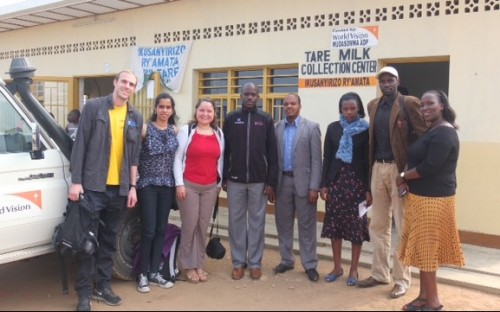A cadre of schools from the UK and wider Europe have flown their students to regions with great potential, but which face social and economic challenges, to consult on business strategy for big corporations and social start-ups.
These students also benefit from company visits to leading multinationals in emerging regions, and from sampling the unique business climate in countries such as Zambia, Uganda and Tanzania.
But the recent outbreak of the Ebola virus in west Africa highlights the difficulties facing many emerging countries, with the World Bank last week warning of a potentially catastrophic impact on some African economies, potentially costing the region $32.6 billion if not contained.
At the same time, emerging economies are entering a new era of slower growth, according to research firm Capital Economics whose findings echoed a similar assessment by the IMF this month.
Like many countries in the aftermath of the financial crisis, Pakistan is struggling with a lack of access to early-stage capital and start-up support. Acumen, a Pakistan-based company that raises charitable donations to invest in businesses that are trying to tackle poverty, is trying to stir up new innovations in the country.
It received a report with recommendations and a new business model after three MBA students from Oxford’s Saïd Business School in the UK parachuted in. They helped the company identify the factors that limit or prevent impact investing in frontier markets.
“It was a great benefit to have three bright and enthusiastic students addressing a real problem that we are working on,” says Sophia Ahmed, business associate at Acumen Pakistan.
The scheme was part of the business school’s spread of strategic consulting projects, which this year saw MBAs work for 29 organisations in 16 countries including Tanzania, Qatar and India.
“The project helped us all gain a deep understanding of how the incubator and accelerator ecosystem works, both in frontier markets such as Pakistan and in developed markets,” says Sudhanshu Malani, an Oxford MBA who worked for Acumen with classmates Manas Nanda and Anchal Kakkar.
Each year, small teams of MBA students complete an eight week-long project for a sponsoring organisation. They are able to apply their MBA learning to specific issues or business opportunities identified by the company.
This year’s Oxford projects included improving the delivery of financial services to rural Ethiopians, analysing the ways in which technology could improve healthcare delivery in India, and assessing the feasibility of a UK spaceport - the resulting report estimating that it will deliver approximately £2.5 billion and 8,000 jobs to the UK economy over 10 years.
It is a similar story at ESSEC Business School of France, according to Lesley Green, a former Global MBA student who completed a consulting project in South Africa for Backsberg Estate Cellars, a leading wine producer based in Cape Town.
“The project in South Africa is what made the MBA stand apart from all the others I looked at. It offered hands-on experience,” she says.
Lesley adds that she felt she needed to “do something drastic” to switch careers and regions from her previous job in Chicago in the United States.
She graduated from ESSEC’s MBA in 2012 and landed a job at Hybris, a software company, in Munich in Germany. “It says to people that you’re willing to try new experiences, branch out, work with new cultures, and see and do things you’ve never done before,” says Lesley.
Global MBA students take a week-long field trip to an emerging market, and spend another four or five weeks on a consulting project in another emerging country.
MBA students are flown as far as the Horn of Africa, where Matthias de Larminat completed a consulting project in Djibouti, on the border of Ethiopia.
He worked with financial services group the Economic Development Fund of Djibouti, a vehicle of the Djiboutian government that provides funding with advantageous interest rates to help companies in the region expand.
“The MBA is gives you the tools to have a global picture and think globally,” says Matthias, who previously worked as head of real estate finance for the French Department of Defence.
Late night Skype sessions with clients in China helped Valentin Beau develop a global picture. A master’s student at Grenoble Ecole de Management in a new track for pedagogical innovation, his consulting project pitched his team of six with a leading Chinese design and rebranding firm.
Valentin says the project focused on two main marketing issues – growing awareness in China to gain market share, and human resources – a lot of the company’s employees left the firm to join rival businesses.
The advantage of an international consulting project is that he got to work with real clients; real businesses. “We had to respect delays, we had to respect the demands and the fact that we had only six weeks,” Valentin says. “A project that happened two years ago – [there are] no deadlines to respect.”
Other European MBA students are helping to drive entrepreneurship in emerging economies. Charles Haines, also an ESSEC MBA, spent six weeks on a consulting project this year with the African Entrepreneur Collective, a business accelerator for young, growth-oriented entrepreneurs across the continent.
He was based in Rwanda, a country which has two-thirds of its population living below the poverty line, but which us striving to rebuild its economy, with coffee and tea production being among its main sources of foreign exchange.
Charles consulted three Rwandan start-ups including URTMCC, a milk collection centre. One of his first decisions was to spin off the company from its co-operative group. “It was the first business spin off I ever experienced,” he says.
Along with MBA classmates Claudia Pumarejo and Dhriti Chandrashekar, Charles also consulted for clean energy company Habona Bio-gas, and Simba Constructors, a general contractor.
The African Entrepreneur Collective was set-up by an MBA graduate of Yale School of Management. The organization works with about 100 clients in Rwanda each year, helping to spur the country’s thriving entrepreneurial class that has begun to emerge.
“African entrepreneurship is growing rapidly. We’re seeing growth in various sectors from IT to renewable energies,” says Charles. “There’s so much hunger over here and so much ambition.”
Such projects not only help emerging entrepreneurs, but also the students themselves – a recent survey of global recruiters by QS found that international study experience is sought after by 67% of MBA employers.
Student Reviews
ESSEC Business School
RECAPTHA :
45
40
b2
d8








